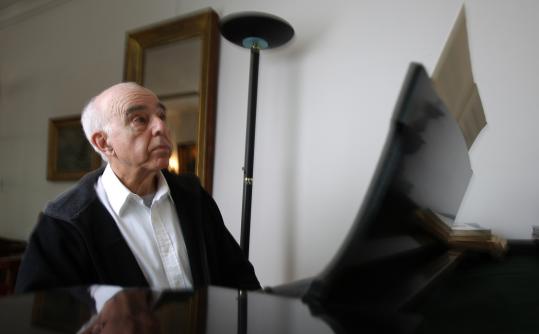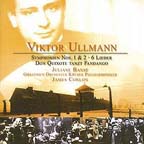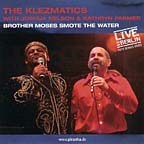 If I had the time, I would wax lyrical about a special evening sponsored by Hebrew College's School of Jewish Music (SJM) this past Saturday night. Instead, I will try to honor Yehudi and Hebrew College, and perhaps whet people's appetite for more.
If I had the time, I would wax lyrical about a special evening sponsored by Hebrew College's School of Jewish Music (SJM) this past Saturday night. Instead, I will try to honor Yehudi and Hebrew College, and perhaps whet people's appetite for more.
The event featured Professor Wyner presenting a series of art song featuring music by his father, Lazar Weiner (father and son spell their family name differently. Insert obligatory immigrant joke here). Wyner introduced many of the songs, and featured singing by a range of luminaries starting with both the President of Hebrew College (Daniel Lehmann) and head of the SJM (Cantor Dr. Brian J. Mayer) and including Cantor Louise Treitman and HC student Rick Lawrence. In addition, we got to listen to several songs by Lynn Torgove, who was also featured in a recent performance (Nov 5, 2010) of Yehudi's own pieces, performed by the Cantata Singers, at Jordan Hall. The voices were magnificent.
The thing is, Yehudi Wyner also helped us hear with his father's ears. As a typographer, for the first time I made that connection between art song—composing music that enables the ears to hear and appreciate the poet's words—and typographer, the art of printing a poet's words so that the words are noticed. In both cases, the communicative medium, whether it be music or print, is most successful when the medium is missed, but the words, the poet's intent, are heard.
 Indeed, as Yehudi stated, and then proved with his playing and the singing of the actual pieces by such masterful voices, Lazar Weiner had an incredible gift for writing spare music, setting the words perfectly. And this music should be studied with German and Italian and French art song—it should not be relegated to an afterthought as though of interest only to musically-educated Yiddishists. This music is wonderful world heritage, not just Yiddish heritage. Wyner talked a little bit about the brief blossoming of Yiddish art song under the patronage of Russian composer Rimsky-Korsakov, in both Moscow and St. Petersburg. Wyner didn't mention the St. Petersburg school by name, but scholars, or those who know just enough to have dipped into the recent Milken Archive series will be familiar not just with Weiner's name, but the names of Joseph Achron, Joel Engel, etc.
Indeed, as Yehudi stated, and then proved with his playing and the singing of the actual pieces by such masterful voices, Lazar Weiner had an incredible gift for writing spare music, setting the words perfectly. And this music should be studied with German and Italian and French art song—it should not be relegated to an afterthought as though of interest only to musically-educated Yiddishists. This music is wonderful world heritage, not just Yiddish heritage. Wyner talked a little bit about the brief blossoming of Yiddish art song under the patronage of Russian composer Rimsky-Korsakov, in both Moscow and St. Petersburg. Wyner didn't mention the St. Petersburg school by name, but scholars, or those who know just enough to have dipped into the recent Milken Archive series will be familiar not just with Weiner's name, but the names of Joseph Achron, Joel Engel, etc.
It is almost criminal that pieces this good are heard so seldom, and I feel very fortunate to have been present to hear Yehudi's stories, along with the exquisite performances. This was not a random event. The SJM is seeking a higher profile, and I would presume would be very happy to talk with sponsors and donors who can further its programs. Starting just a few years ago, there are now 31 students and 10 graduates. All of the graduates, according to Acting Dean Mayer, found immediate employment. That, too, is a neat statement in these times. Stay tuned for a symposium on Yiddish Art Song later in 2011 which will feature scholars such as Mayer, Josh Jacobson, Hankus Netsky, and other members of a very rich Jewish music community here in Boston.
If you are interested in knowing more about the music of Weiner (and Wyner!), or the SJM, check out their website, www.hebrewcollege.edu/jewish-music-cantor. You should also contact them to get on the mailing list for the forthcoming symposium.
 I picked this up at a recent concert by the
I picked this up at a recent concert by the  If I had the time, I would wax lyrical about a special evening sponsored by Hebrew College's
If I had the time, I would wax lyrical about a special evening sponsored by Hebrew College's  Indeed, as Yehudi stated, and then proved with his playing and the singing of the actual pieces by such masterful voices, Lazar Weiner had an incredible gift for writing spare music, setting the words perfectly. And this music should be studied with German and Italian and French art song—it should not be relegated to an afterthought as though of interest only to musically-educated Yiddishists. This music is wonderful world heritage, not just Yiddish heritage. Wyner talked a little bit about the brief blossoming of Yiddish art song under the patronage of Russian composer Rimsky-Korsakov, in both Moscow and St. Petersburg. Wyner didn't mention the St. Petersburg school by name, but scholars, or those who know just enough to have dipped into the recent
Indeed, as Yehudi stated, and then proved with his playing and the singing of the actual pieces by such masterful voices, Lazar Weiner had an incredible gift for writing spare music, setting the words perfectly. And this music should be studied with German and Italian and French art song—it should not be relegated to an afterthought as though of interest only to musically-educated Yiddishists. This music is wonderful world heritage, not just Yiddish heritage. Wyner talked a little bit about the brief blossoming of Yiddish art song under the patronage of Russian composer Rimsky-Korsakov, in both Moscow and St. Petersburg. Wyner didn't mention the St. Petersburg school by name, but scholars, or those who know just enough to have dipped into the recent  You may have heard Israeli-born cellist
You may have heard Israeli-born cellist  Bassist Jim Guttman has been the rock holding Boston's own
Bassist Jim Guttman has been the rock holding Boston's own  Mike notes the Ashkenaz Festival debut by the
Mike notes the Ashkenaz Festival debut by the  I've never heard of jazzman Benny Sharoni until I read Mike's review of
I've never heard of jazzman Benny Sharoni until I read Mike's review of 

 James Loeffler announces this new organization, of which he is the Research Director, and the groups'
James Loeffler announces this new organization, of which he is the Research Director, and the groups' 

 Okay, one more important article that has been waiting several months. Stewart Cherlin has been writing for the KlezmerShack since 1997. His most recent article is about the Czech composer, Viktor Ullmann, who composed some amazing music in Terezenstadt before being shipped off to Auschwitz by the Nazis. Those who heard the lecture on his music at the Milken Conference a couple of years ago, or who have been privileged to otherwise encounter his music know that this isn't just your average Schoenberg-student does 20th century shtick music—this is "stick it to the Nazis in full glorious and conscious defiance" music. Many thanks to Stewart for writing an article about the music, and this past summer's performances in Chicago. We've added some links to learn more about Ullmann, as well.
Okay, one more important article that has been waiting several months. Stewart Cherlin has been writing for the KlezmerShack since 1997. His most recent article is about the Czech composer, Viktor Ullmann, who composed some amazing music in Terezenstadt before being shipped off to Auschwitz by the Nazis. Those who heard the lecture on his music at the Milken Conference a couple of years ago, or who have been privileged to otherwise encounter his music know that this isn't just your average Schoenberg-student does 20th century shtick music—this is "stick it to the Nazis in full glorious and conscious defiance" music. Many thanks to Stewart for writing an article about the music, and this past summer's performances in Chicago. We've added some links to learn more about Ullmann, as well. George Robinson writes frequently for the Jewish Week. He listens to an incredible diversity of music. Take a read of
George Robinson writes frequently for the Jewish Week. He listens to an incredible diversity of music. Take a read of  We were distracted last summer and almost missed this wonderful article about Italian Jewish Musical traditons, by Ruth Gruber (whose most recent book is the rather amazing "
We were distracted last summer and almost missed this wonderful article about Italian Jewish Musical traditons, by Ruth Gruber (whose most recent book is the rather amazing " Jeffrey Schanzer writes:
Jeffrey Schanzer writes: Richard Sharma has posted several reviews of wonderful klezmer albums to the Jewish-music list. The author has given us permission to post this one to the KlezmerShack, and we thank him profusely. Our own delay in getting this reviewed is only partially mitigated by Mr. Sharma's well-written, and suitably enthusiastic words:
Richard Sharma has posted several reviews of wonderful klezmer albums to the Jewish-music list. The author has given us permission to post this one to the KlezmerShack, and we thank him profusely. Our own delay in getting this reviewed is only partially mitigated by Mr. Sharma's well-written, and suitably enthusiastic words: